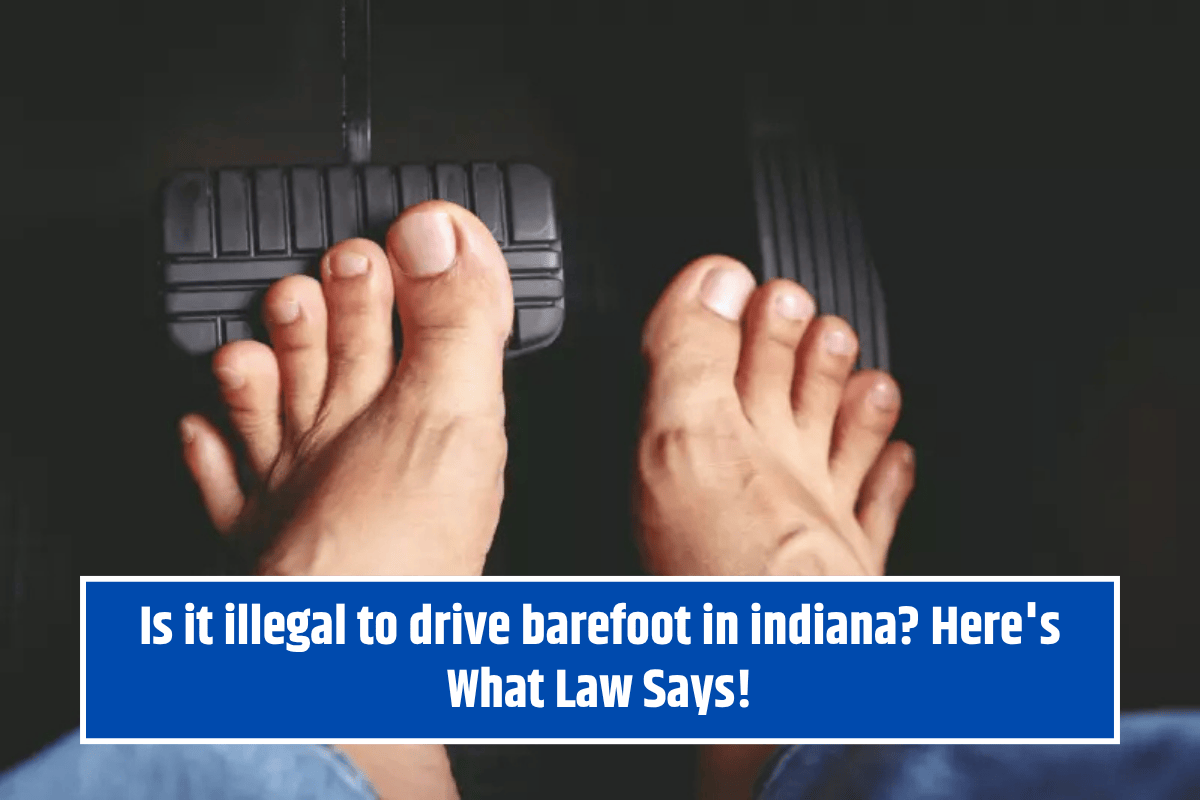During the hot summer months, many drivers like to kick off their shoes while driving to stay cool and comfortable. However, is it safe to drive barefoot? More importantly, is it legal to drive without shoes in Indiana? In this article, we’ll explore the rules, risks, and potential legal issues around barefoot driving in the state of Indiana.
Is Barefoot Driving Legal in Indiana?
Yes, it is legal to drive barefoot in Indiana. There is no law in the state that bans driving without shoes. Just like most other states in the U.S., Indiana leaves it up to the driver to decide whether or not to wear footwear while driving.
However, while it may be legal, driving barefoot is not always the safest option.
Why Barefoot Driving Can Be Risky
Although it might feel comfortable, driving barefoot has its risks. One of the main concerns is the possibility of your foot slipping off the pedals, especially in emergency situations where you need to brake quickly. Wearing shoes can provide better grip and support, helping you maintain better control over your vehicle.
According to the National Highway Traffic Safety Administration (NHTSA), around 94% of serious accidents are caused by driver-related factors, including poor control of the vehicle. While there is no exact data on barefoot driving, it’s clear that losing control of the pedals can contribute to accidents.
Can Barefoot Driving Affect Legal Liability in an Accident?
While it’s legal to drive barefoot in Indiana, doing so could affect your case if you are involved in a car accident. If it’s proven that driving barefoot caused your foot to slip off the pedal and contributed to the crash, you might be held partially responsible.
Indiana follows a modified comparative fault rule. This means that if you are found to be partially at fault, your compensation will be reduced according to your percentage of fault. For example, if you are 20% at fault for an accident, your settlement will be reduced by 20%.
If you are in an accident and suspect that barefoot driving may have contributed to it, it’s important to consult with a car accident lawyer in Indiana. They can guide you on how your footwear choice may affect your case and help you navigate insurance claims.
Will Insurance Cover an Accident If You Were Barefoot?
In general, most insurance companies don’t have specific rules against driving barefoot. However, in certain situations, an insurer might argue that driving without shoes was reckless or unsafe, potentially affecting your claim.
In such cases, having an experienced car accident attorney on your side can be very beneficial. A lawyer can help prove that driving barefoot wasn’t the cause of the accident or wasn’t a major factor in the crash.
When Is Barefoot Driving Safer?
Interestingly, there are situations where barefoot driving could be safer than wearing certain types of shoes. For instance, flip-flops are known to slip off or get caught under the pedals, and shoes with loose soles or heels can cause problems with control. In these cases, driving barefoot may actually provide better grip on the pedals.
According to the AAA Foundation for Traffic Safety, loose footwear is one of the common causes of pedal errors, leading to unintentional mistakes. In such instances, driving barefoot might be the safer choice—though it’s still not always the best option.
What to Do After an Accident Involving Barefoot Driving
If you are involved in a car accident while driving barefoot, it’s important to consult with a car accident lawyer. They can help you:
- Understand if your choice of footwear could affect your legal case
- Deal with insurance companies who may argue your driving was unsafe
- Gather evidence and build a strong legal argument
A lawyer can ensure that your rights are protected and help you pursue fair compensation for any injuries or damages, regardless of whether barefoot driving played a role in the accident.
Key Takeaways: Barefoot Driving in Indiana
- It is legal to drive barefoot in Indiana, but it can increase the risk of an accident.
- If barefoot driving is found to have caused or worsened an accident, you could be held partly responsible.
- Insurance companies may argue that barefoot driving was reckless and may try to reduce or deny your claim.
- It’s a good idea to keep a pair of safe driving shoes in your car to avoid potential safety or legal issues.
- If you are involved in an accident while driving barefoot, consult with a qualified car accident lawyer to protect your legal rights and navigate the claims process.












